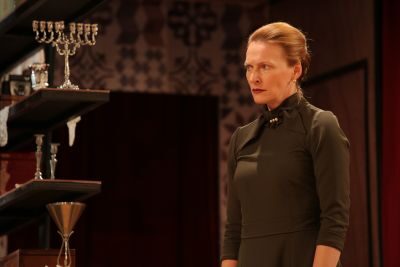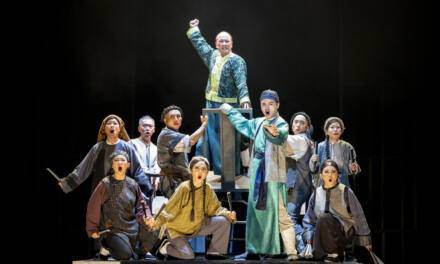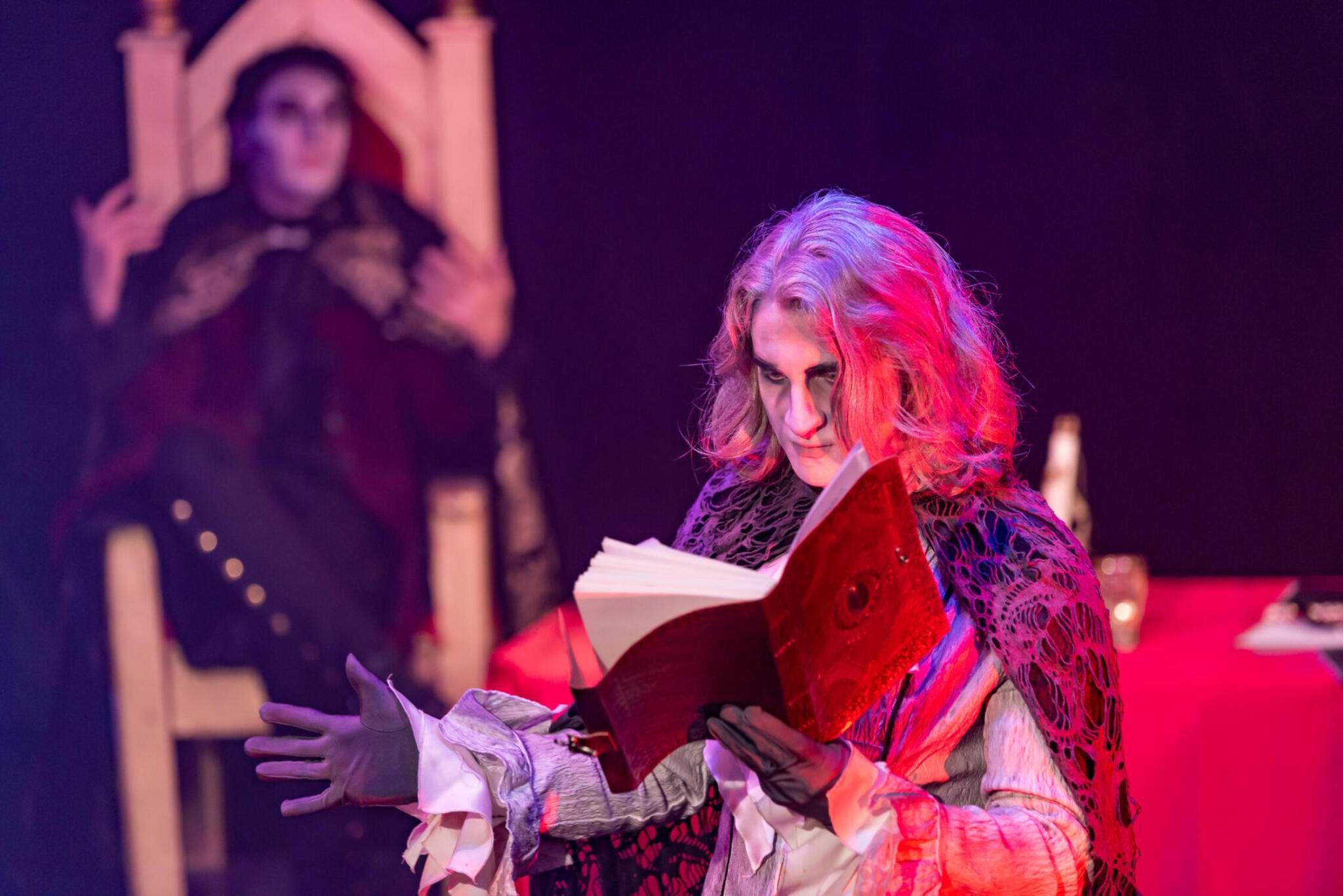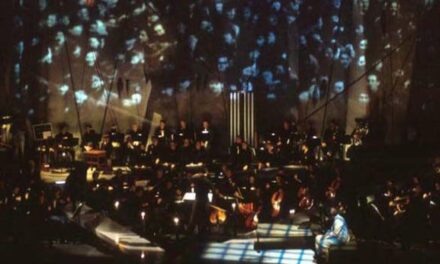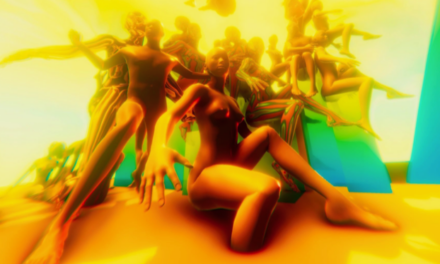Interviewer: You had said once “My plays are generally about things that perplex me. And worry me… I never solve any problems. I usually wind up with more questions and uncertainty than I started with.” What perplexed and worried you with The Last Schwartz?
Deb Laufer: I have a lot of questions about religion, about its usefulness, what it brings to people’s lives and what it takes away. I’m intrigued to observe whether the letter of the law is the way to find the lost joy. A lot of people doubt that you can be a moral person if you are an atheist, at least in the US. Atheists are very suspect. And I have so many questions about being religious…
I: Have you found any answers to that?
D.L: I’m just searching. I haven’t said that in any interviews, but I’m an atheist. I live in a very religious country which is getting more and more religious. You could be elected president of the US if you’re observing ANY religion but not if you’re an atheist. In this way, I feel sort of like an outsider. Which is a good place for a writer to be. I’m always searching for the connections between religion and science, a lot of my writing is about that, how they connect, how they bristle. It must be a tremendous comfort and relief to be religious, to believe in an afterlife; I wish I had that to offer to my kids, but I just don’t have the genetic makeup for that.
I: Religion imposes a lot of restrictions on people’s lives and at the same time, it lifts a lot of weight.
D.L: Those are the things I grapple with in my plays. But there is some comfort and beauty in having a long history, and heritage; you understand where your people, your tribe came from, and there’s something beautiful in it. This is a value which leads you to the consequence that if there was such a long past, there will be a future for us as well. It’s a good jumping-off point to the future.
What I don’t understand is these trendy genetic testing these days; people wanting to know who they are, where they came from… so they take all these tests that are in my view, so averse; I don’t think they’re relevant. You are who you are, you are what you do, what you say, and the impact you make on life and on others. You are not what a genetic profile says. You decide who you are.
I: That may give people a sense of safety and it also looks scientific to know I’m 34 % this, 20 % that and 15 % the other.
D.L: But originally, we all came from the ocean. It doesn’t matter that you want to prove you are a descendant of the queen of Romania. We all came from the same muck.
I: But memory, remembering, and heritage are considered very important. Not just today, it always used to be like that. Looking back, identifying where you came from, which family you belong to appears very satirically in your play. One observes those rules too strictly, the others don’t give a damn.
D.L: Exactly. The sense of belonging is observed less and less by each child.
I: Is religion still a part of one’s identity?
D.L: It is, very much. It offers a tribe, community, a common background, a ritual. Particularly around death, it’s vital because it says: look, this is how it’s done. You go through the motions, the parts of the ceremony without thinking because you’re taught how to do it. And you’re not in the frame of mind to decide each minute.
I: The Last Schwartz proves that family and community are very important for you. Does that appear in your other plays? And how?
D.L: Most of my plays are about people seeking for answers and salvation. They’re going to extreme lengths to find it. And ultimately where they do find it is in the lives of the people they live with. It’s easy to downgrade the life you live, to downgrade what you have and say the party across the street is livelier than the party I’m at. One of my favorite plays is Thornton Wilder’s Our Town, the message is that you’re living a life, so live it, you have a short time, so go ahead and live it. Forget your regrets, forget the past you always want to go back to, your life is around you! This is an American classic but my plays revolve around this idea, too. Look around you and live your own life.
I: It’s great you mention Wilder as a source of inspiration. Is there a list of “ingredients” to your play? How much Chekhov, how much Albee, how much Arthur Miller or Eugene O’Neill is there in your drama?
D.L: This play is very The Cherry Orchard of course. Cherry Orchard upstate New York for Jews with the disintegration of a home, a disintegration of a family and a culture, respectively. Chekhov is the main influence on me. Not only in The Last Schwartz, but also in my The Three Sisters of Weehawken, whose whole dream is to get to Manhattan but they never get to do it. The message there is also “do it”, do what you want to do today, tomorrow may not be time for it. But Beckett’s influence is also there. I wish there were more female playwrights to turn to as an inspiration but there aren’t so many in our canon. Marsha Norman is one, who was my teacher at Juilliard College. Women have so much trouble being produced and staged. Marsha Norman and July Jordan did this survey about female playwrights. They sent some synopses and letters to five hundred literary managers and artistic directors asking them if they’d be interested to read the whole play, and how they liked the main character and eventually if they’d be interested to put that play on stage. And they signed half of the letters as Mike Smith and the rest as Mary Smith. The overwhelming majority of the letters signed by male names came back with positive answers, whereas artistic directors did not even want to read the whole play of those with female names…
I: It really is incredible.
D.L: It is because we live in a patriarchy. Even female directors refused them in large numbers. There was another survey which showed that only 11 % of plays done in New York were written by women. Although, there are about as many male and female playwrights. But that was maybe 10 years ago, now it’s somewhere around 30 % which is slightly better.
I: Jumping back to Chekhov for a second: I found that in your play there were less Chekhovian dialogues than real, funny ones reminiscent of those in Albee’s plays. Is that a correct observation or too far-fetched?
D.L: It’s not far-fetched. Those are extremely well-composed dialogues where something’s always going on under the surface but you don’t know it, you just suspect that it must be something big; And when it gets revealed, you all of a sudden realize all those funny and inexplicable behaviors.
Another big influence of mine is Craig Lucas and his “would you love me no matter what” experiment. I’ve taken it to the extreme in End Days: There’s an elderly Jewish couple mourning 9/11, the husband being so depressed he’s going around in pajamas, and the wife is behaving evangelically – literally welcoming Jesus into her life and walking with him.
I: Does tradition always play a great role in your plays?
D.L: I’d say so, yes. I’ve written a lot about science, or scientific breakthroughs lately – my last 3-4 plays are about that – huge changes of what we can know, and do because it’s a great way of looking at what is lost with those breakthroughs. That is a particular way of looking at traditions. Like when people started to write, they were afraid that they were going to lose the ability to tell stories. Or when television came about, they thought reading, theatre and film was over. Every novelty is the death of something. That’s progress, we lose and we gain. Mankind originally had a rather elevated concept about itself, like the sun revolving around us and animals having no feelings, while it turned out that the earth revolves around the sun and animals are genetically, neurologically are much closer to us than we had thought.
I: These are more about institutions, discoveries. Tradition is more spiritual, intellectual. These things change more slowly.
D.L: You are right. I didn’t have a bar mitzvah, but I realize the beauty and the significance of it and what it offers people. And I recognize it when it’s lost as a tradition. I mourn the death of each plant or animal that goes extinct and even more, the extinction of a language. With that, a whole civilization, a whole world dies, that’s a heartbreaking loss.
I: How happy are you with the Hungarian production of The Last Schwartz?
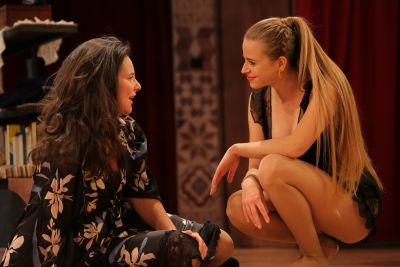
Actresses Kata Péter and Lili László, The Last Shwartz. Directed by: Mate and Tibor, 2019. Photo Credit: Revizor.
D.L: I’m happier than I can say – I can’t even say. I’ve been in conversation with the directors Máté and Tibor for a long while, so I knew they took very good care of it. Máté seems to have such a deep understanding of the play, which is very rare. He asked such profound questions about character motivation that I haven’t come across in a long time. About why people are doing what they’re doing – we kept going back and forth on the play several times for a month. You see, that was the reason I said I might come and see it for myself. It was such a full realization of the world I had envisioned; I just feel so rich and grateful for having gotten to see it. It was so great to see that he connected to this play so deeply – It doesn’t always happen. The audience also responded well and adequately to everything that happened on stage.
I: What are your next plans? What are you working on now?
D.L: I wrote a play on a commission that has had five productions by now in Chicago. I’m going to direct the next production in Baltimore next January. When I had it produced, the artistic director took me out for coffee and said: “I think this play is a trilogy” and they wanted to commission the second and the third part. I’ve just finished the second part, and the third is just ahead. That’s the greatest gift a playwright can have.
I: How much time does it take you to write a play? What’s your average?
D.L: Some plays have taken for me to write up to two years. It depends on the play, the topic. I usually research a tremendous amount and usually think about it a lot in advance, but the actual writing is not that long. Of course, when I finish it, I’m not the same person I was when I started it, and it shows. So, there’s a lot of shifting and fighting to make it a whole. But if I write it quickly, the original impulse is there, so the faster the better.
This article appeared in RevizorOnline.com on November 4th, 2019, and has been reposted with permission. For the original Interview, click here.
This post was written by the author in their personal capacity.The opinions expressed in this article are the author’s own and do not reflect the view of The Theatre Times, their staff or collaborators.
This post was written by Merényi Ágnes.
The views expressed here belong to the author and do not necessarily reflect our views and opinions.

